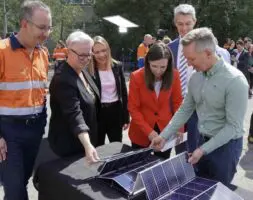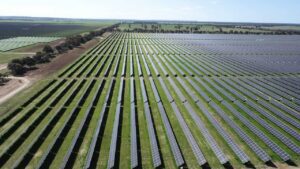ACT independent senate candidate, David Pocock, wants to electrify Australian households under an ambitious plan that the former Wallabies captain says would slash energy costs and emissions.
Pocock, who played 78 Tests for the Wallabies before turning climate activist, said the electrification of household energy use could cut Australia’s emissions by as much as 42 per cent while cutting energy costs by thousands of dollars.
On Tuesday, Pocock unveiled his proposal for an Australian-wide National Electrification Program plan, designed in collaboration with Saul Griffith and Rewiring Australia, to shift households off gas use and to driving electric vehicles.
To kick-start the proposal, Pocock has pitched a ‘Suburb Zero’ trial to convert an entire Canberra suburb into one that is fully electrified, to serve as a demonstration of how households could be entirely powered by renewable electricity.
“Canberrans have led the country when it comes to making the switch to renewable energy sources. More than 20 per cent of homes in the ACT are already equipped with rooftop solar, with more installations happening every week,” Pocock said.
“This makes the ACT the perfect place to host this trial to demonstrate and bring forward the tangible benefits of electrification at scale.”
Rewiring Australia, launched by Griffith last year, has called for virtually all of Australia’s energy use to be electrified, allowing it to be powered by wind and solar energy, cutting costs and greenhouse gas emissions.
Pocock said the two-year trial would guarantee that participating Canberra households would save between 20 and 25 per cent on their fuel and energy costs. Households would be equipped with an electric vehicle, rooftop solar, battery storage, heat pumps and other electric appliances as part of the trial.
“In the face of skyrocketing costs of living, worsening impacts from natural disasters and serious warnings from the IPCC, our community needs pragmatic policies that address all of these problems,” Pocock said.
“Rising inflation in the absence of real wages growth means households are going backwards.”
“Canberrans currently spend over $950 million per year on fuel and energy. What I am proposing is just as much a cost-of-living as a climate and energy policy.”
The plan is estimated to require $20 million in federal government support, with the prospect of securing a further $50 million in private sector backing.
According to Pocock, if the demonstration trial was rolled out Canberra-wide, it could save households as much as $5,200 each year on their fuel and energy costs while supporting the creation of an additional 5,500 jobs.
“Fundamentally, this policy is about creating jobs, saving people money and ensuring the ACT reaps the benefits of the smart energy transition that is already underway,” Pocock said
“We have the solutions to reduce energy bills and to put Canberra at the forefront of the renewable energy transition, now we just need the leadership to get it done.”
“The program would create a massive pipeline of work for tradespeople, including huge opportunities to upskill and retrain, as well as ploughing some $2 million worth of cost savings each year on fuel and energy bills back into the local economy,” Pocock said in a statement.
Pocock is one of two ‘climate independents’ looking to unseat incumbent Liberal senator Zed Seselja, with law academic Kim Rubenstein also launching her own independent challenge.
Following his rugby union career, Pocock took up climate change activism and a range of environmental causes, including the Rangelands Restoration Trust conservation project in his birth country Zimbabwe.
The ACT elects just two senators at each federal election, with former ACT chief minister Katy Gallagher holding the second senate seat for Labor.
It makes for a tough contest to unseat Seselja, with any successful challenger needing to beat the Liberal senator in securing a 33 per cent vote quota.
Pocock said that he would seek to work with the ACT Government on the electrification trial, which has previously backed the development of one of Canberra’s first gas-free suburbs.










